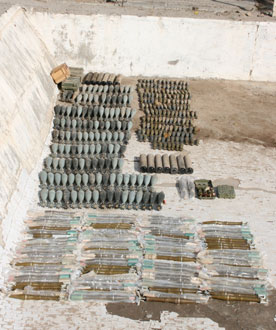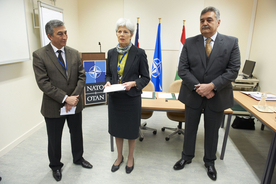NATO-sponsored project to help secure dangerous munitions in Tajikistan
Fifteen years after the end of a civil war, Tajikistan is left with thousands of tonnes of munitions insecurely stored in makeshift storage sites across the country. Aside from the many known munitions caches, several more lie undiscovered, posing a major security threat to the Tajik people. A Partnership Trust Fund project, officially launched on 31 January, will soon help Tajikistan to counter this threat.

Big security risks

“The storage locations are often dilapidated without enough room, where munitions that should not be together lay side by side,” says Alexander Griffiths from the NGO Swiss Foundation for Mine Action (FSD), an organization experienced in demining and munitions-control operations around the world, including in Tajikistan. “Most storage sites are just warehouses, poorly maintained and insecure,” he points out.
Caches present a variety of temptations for criminal elements seeking munitions: aircraft bombs, mortars, heavy machine guns, rocket-propelled grenade launchers, and shoulder-launched surface-to-air missiles.
Another danger stems from the fact that some of the munitions’ components deteriorate as they age, becoming very unstable. With Tajikistan’s dry summer temperatures, during which temperatures can reach up to 50ºC, the risk of a fire that could cause the munitions to detonate is a very real possibility.
Tracking down unidentified caches
Efforts by other international bodies such as the Organization for Security and Co-operation in Europe and the United Nations Development Programme have focused on demining and securing known stocks of munitions. The problem of hidden stocks still needs to be tackled. “What we have seen up to now is approximately 30 000 tonnes, but we believe that there is significantly more,” says Griffiths.
NATO agreed to develop a Partnership Trust Fund project with Tajikistan to help find unidentified caches and either secure or destroy them. With an estimated cost of more than €575 000, the project was launched with the signing of formal agreements at NATO Headquarters on 31 January 2012. The Ambassador of Tajikistan to Belgium, Rustamjon Soliev, called today’s signing of the formal agreements “the first step in Allied cooperation.”
NATO hopes that by securing these unidentified stocks, the project will help prevent illegal cross-border trade in munitions. The task is even more critical because of Tajikistan’s southern border with Afghanistan, where full control for security is due to transition to Afghan national security forces by end 2014.
The project’s scope
Overseen by the NATO Maintenance and Supply Agency (NAMSA), Tajik military engineers and soldiers will be recruited, trained and deployed as part of a weapons and ammunition disposal (WAD) team once sufficient funding has been secured.
Over a 12-month period, the team will work with government agencies and local communities to locate and dispose of dangerous munitions stocks, coordinating with three other WAD groups managed by FSD already operating in Tajikistan under different frameworks. Weapons and ammunition that are still serviceable will be secured and transferred to proper storage facilities.
The team, which will be trained by the FSD, will also conduct a survey of ammunition storage locations on the southern border with Afghanistan and recommend ways to improve safety and security. “These types of projects are not only saving people but saving the environment,” pointed out Antonios Chatzidakis, General Manager of NAMSA.
United Kingdom and Japan team up

Leading the project, the United Kingdom has contributed £100 000. “The UK is delighted to be the lead nation of the first NATO Trust Fund in Tajikistan,” says British Ambassador to NATO, Mariot Leslie. “By securing and destroying surplus munitions, the UK, the other contributing nations and NATO are making a significant contribution to the safety of the region.”
Japan has contributed an initial €100 000, which included funding the project’s feasibility study presented to NATO nations in March 2011. “Tajikistan is only one piece of the cooperation between Japan and NATO concerning regional security,” says Kurato Shiraishi, First Secretary at the Japanese Embassy to Belgium. “The security of the region and of the international community is our interest and concern.” Japan has previously helped fund regional security and Trust Fund projects in other countries, including in Afghanistan, Azerbaijan and Georgia.
The signing of the memorandum of understanding on 31 January will make it easier to attract further voluntary contributions from other nations for this important project.
